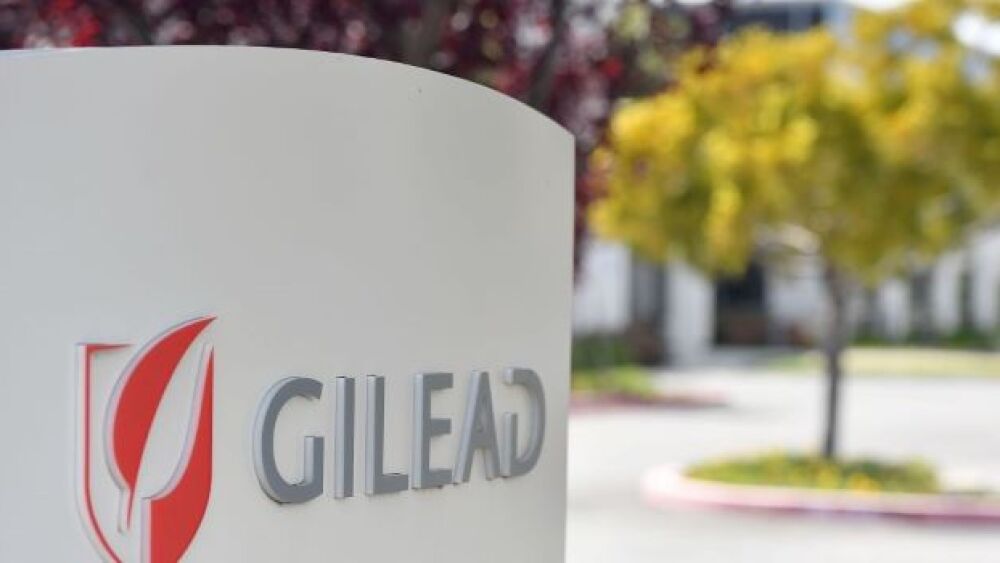Gilead, Merck, Daiichi Sankyo, HUTCHMED and BMS previewed data to be presented at the European Society for Medical Oncology Congress 2022, taking place Sept. 9-13.
Josh Edelson/AFP via Getty
The European Society for Medical Oncology (ESMO) Congress 2022 will be held Sept. 9-13 in Paris and feature new oncology data and highlights from pharma and biotech companies across the globe.
Gilead Previews New Trodelvy Analysis
One of these companies is Gilead, which will present a new subgroup analysis of breast cancer patients treated with Trodelvy in the Phase III TROPiCS-02 trial. The study showed improved progression-free survival (PFS) regardless of HER2 status, the company stated.
TROPiCS-02 assessed Trodelvy against chemotherapy in HR+/HER2- metastatic breast cancer patients who progressed on endocrine-based therapies and at least two chemotherapies.
The updated analysis shows Trodelvy improved PFS regardless of HER2 status in patients by a median of 6.4 months. The benefit was seen in both HER2-low (IHC1+ and IHC2+/ISH-negative) and IHC0 groups, Gilead reported.
The post hoc data builds on previously announced findings from the TROPiCS-02 study. Earlier this year, Gilead presented data that showed Trodelvy met its primary endpoint by demonstrating a statistically significant improvement in PFS versus the physician’s choice of chemotherapy.
In August, the company announced additional data from a second analysis of the Phase III study that showed statistically significant and clinically meaningful overall survival data. Full OS data was not yet available at the time.
Trodelvy is a first-in-class antibody-drug conjugate (ADC) and topoisomerase inhibitor directed at the Trop-2 receptor. This is a protein commonly expressed in multiple types of epithelial tumors, including in more than 90% of breast and bladder cancers.
“Our data at ESMO, including overall survival results in advanced breast cancer, demonstrate Gilead’s continued efforts to grow our pipeline and impact people living with cancer who face some of the greatest gaps in care,” Merdad Parsey, chief medical officer of Gilead Sciences, told BioSpace in an e-mail.
Merck Showcases Oncology Portfolio at ESMO
Merck will present research across 16 different cancer types at ESMO. Among the highlights will be information from the KEYNOTE-189 trial assessing Keytruda in combination with chemotherapy as first-line treatment for patients with metastatic non-small cell lung cancer (NSCLC).
Merck will also reveal seven-year OS data from the Phase III SOLO-1 study. SOLO-1 is evaluating Lynparza in patients with advanced BRCA-mutated ovarian cancer who have received platinum-based chemotherapy as a first-line treatment.
Additionally, Merck will share final OS results from the Phase III PAOLA-1 trial assessing Lynparza in combination with bevacizumab as a second-line treatment for advanced ovarian cancer.
On the Keytruda front, Merck will present first-time data from cohort K of the Phase Ib/II EV-103/KEYNOTE-869 trial studying the checkpoint inhibitor in combination with Padcev as a first-line treatment for patients with cisplatin-ineligible unresectable locally advanced or metastatic urothelial cancer. Earlier this year, the company posted positive topline results from the study that showed the combination achieved its primary endpoint.
In other first-time data, Merck will share a report from the SWOG S1801 Phase II trial assessing a neoadjuvant against Keytruda as a potential treatment for clinically detectable and resectable stage III to IV melanoma.
Daiichi Sankyo Touts ADC Pipeline at ESMO
Daiichi Sankyo and AstraZeneca will present late-breaking data from the Phase II DESTINY-Lung02 trial assessing Enhertu, an ADC, in patients with previously treated HER2 mutant metastatic NSCLC.
Last month, the FDA greenlit Enhertu for this indication under the accelerated approval pathway following trial data that showed an objective response rate of 57.7%.
Updated data from both the HER2 mutant and HER2 overexpressing cohorts of the DESTINY-Lung01 Phase II trial also will be presented, the company announced.
Additionally, Daiichi Sankyo will present follow-up data from a Phase I/II trial evaluating DS-7300 in patients with heavily pretreated metastatic solid tumors. Cancer types include extensive-stage small cell lung cancer, castration-resistant prostate cancer, esophageal squamous cell carcinoma and squamous NSCLC. DS-7300 is the company’s B7-H3-directed ADC.
HUTCHMED’s FRESCO-2 Colorectal Cancer Study
China’s HUTCHMED will highlight initial results from its FRESCO-2 study evaluating fruquintinib against placebo in patients with advanced, refractory metastatic colorectal cancer. Fruquintinib is a highly selective and potent oral inhibitor of VEGFR-1, -2 and -3.
Last month, the company announced the Phase III trial met its primary endpoint of OS. The study also hit secondary endpoints, HUTCHMED reported at the time. Fruquintinib’s safety profile was consistent with previously reported studies.
“We are very pleased with the significant and clinically meaningful FRESCO-2 Phase III results with fruquintinib in patients with refractory colorectal cancer across study sites in the U.S., Europe and Japan. As a result of these data, we plan to pursue regulatory approvals in each of these regions in the coming months, based on prior interactions with regulators,” Marek Kania, chief medical officer of HUTCHMED told BioSpace in an email.
Based on the data, HUTCHMED announced its intentions to seek regulatory approval for fruquintinib in multiple markets, including Japan, Europe and the United States. Fruquintinib received Fast Track Designation from the FDA.
BMS to Highlight Opdivo and Opdualag
Bristol Myers Squibb plans to present data from more than 90 different studies at ESMO, including new data from its checkpoint inhibitor Opdivo. In its announcement, BMS said presentations will include data that support the use of Opdivo as a treatment in earlier stages of cancer.
BMS will share data from CheckMate-816, which is assessing Opdivo plus chemotherapy in patients with resectable NSCLC. Biomarker analyses from CheckMate-274, a study of Opdivo in patients with muscle-invasive urothelial carcinoma, including tumor and immune features associated with disease-free survival, will also be presented.
BMS will also share response outcomes from RELATIVITY-047, a clinical trial evaluating Opdualag, a fixed-dose combination of the anti-PD-1 nivolumab and relatlimab, a LAG-3 blocking antibody, against Opdivo in previously untreated metastatic or unresectable melanoma.





